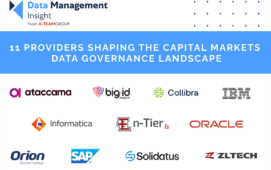European firms need to collaborate with each other if they are to provide practical input to important regulatory driven standardisation efforts such as the development of a new legal entity identifier by the US Office of Financial Research (OFR), according to JWG’s CEO PJ Di Giammarino. In order to facilitate this transatlantic feedback process, JWG’s Customer Data Management Group (CDMG) has teamed together with the British Bankers’ Association (BBA) and the Association for Financial Markets in Europe (AFME) to establish a new working group: the Global Regulatory Identifier Steering (GRIS) Group.
The BBA and JWG have already worked together previously to produce a joint response to the OFR consultation on the subject of a legal entity identifier by the end of January deadline. As one of the few European responses to the OFR, the document, which also includes feedback from the Systemic Risk Working Group of University College London (UCL), displays a high degree of caution about the introduction of an identifier that seeks to do too much, too fast. The stress is placed on a step by step approach that takes into account all players in the financial markets, beyond just data managers and regulators, and a global perspective.
Di Giammarino has also previously highlighted the potential costs of the OFR for the financial services industry at large and warned of the dangers of not providing feedback to the US regulatory community ahead of the 15 July deadline for a decision on the identification standard itself. Speaking at this week’s TSAM conference in London, he reiterated this warning and stressed the need for international input into this US led work. He highlighted previous industry driven group projects such as MiFID Connect as a model to bear in mind to this end (in terms of both positive and negative lessons learned).
“We need to ensure that all the practical aspects of introducing the new standard identifier are taken into account, such as how this will impact the work going on in Europe around the Single Customer View (SCV) and how it will be affected by data privacy legislation,” he contended. Di Giammarino noted that there is a danger of the regulatory community not taking into account the complexities of producing and maintaining this data, adding, “we also need to look at the subject of tariffs seriously”. Cost to the industry is a serious matter, especially given the current data quality challenges in the legal entity data space.
In keeping with the JWG, BBA and UCL feedback to the OFR, Di Giammarino indicated that a global standard is important and international consistency is vital. “This standard cannot be mandated from the top down, without first receiving input about the practicalities from the bottom up,” he said. Relevant experts within financial institutions need to be consulted directly for their input including those outside of the data management world such as downstream users of the entity and instrument data.
In the OFR feedback, the groups suggest that the OFR should also initially focus on the wholesale business before it extends to other corners of the market in order to ensure it does not bite off more than it can chew. Di Giammarino also pointed to the continued regulatory divergence at the level of the G20 as a potential challenge: if regulators are not on the same page, what hope does the industry have? He added that a single utility approach might not be the answer as it could represent a systemic risk as a single point of failure itself.
A number of specific operational challenges are highlighted within the JWG, BBA and UCL response including the need for a “lightweight” standard and concerns regarding data quality and maintenance. It is likely that these will be raised in the upcoming meetings of the group and during the meeting of the Object Management Group (OMG) and EDM Council in Arlington, Virginia later this month.
Subscribe to our newsletter




